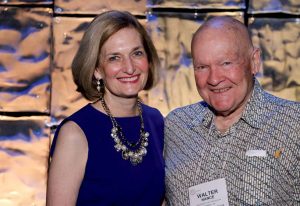Cynthia Morton, PhD’82 (HGEN), has been interested in genetics since eighth grade when she needed a topic for a term paper. One of Morton’s former teachers suggested focusing on twins. Morton delved deep, and she has been hooked ever since.
This story first appeared in the fall 2017 issue of the medical school’s alumni magazine, 12th & Marshall. You can flip through the whole issue online.

Cynthia Morton with her mentor Walter Nance, M.D., Ph.D., at her American Society of Human Genetics presidential address in 2014.
Today Morton is a professor of OB-GYN and reproductive biology and of pathology at Harvard Medical School and director of cytogenetics at Brigham and Women’s Hospital. A past president of the American Society of Human Genetics, her research aims to uncover the genetic causes of hearing loss and uterine tumors. She also is drawing on her training in cytogenetics, a field that looks at chromosomal rearrangements, to hunt for genes associated with human development.
Morton earned her Ph.D. in human genetics on the MCV Campus in 1982. There she became the protégé of Walter Nance, M.D., Ph.D., longtime chair of the Department of Genetics and a past president of the American Society for Human Genetics. “She was one of my best students,” he says. Even after Morton graduated, Nance continued her education by teaching her about applied probability in the annual poker game he organized.
In her 35-year career, Morton has received many accolades. She served as editor of the American Journal of Human Genetics, chair of the Board of Regents of the National Library of Medicine and in 2015 was elected a fellow of the American Association for the Advancement of Science.
Morton and her colleagues are on the cusp of launching a project called SEQaBOO (it rhymes with ‘peekaboo’ and is shorthand for SEQuencing a Baby for Optimal Outcome), which aims to sequence the whole genomes of approximately 400 newborns who do not pass newborn hearing screening. “We want to be able to identify new genes involved in hearing loss and also potentially mutations that have been difficult to detect by alternative methodologies.” she says, such as chromosomal structural rearrangements.
The hope is that once more therapies become available, physicians will be able to tailor interventions for different kinds of deafness. Eventually they might even be able to correct hearing loss by gene editing or gene therapy.
But this information can be valuable today, too, Morton says. For example, researchers know that children who have a mutation in one particular gene, called GJB2, tend to respond well to cochlear implants. And children with a mutation in another gene may not do well with hearing aids. In fact, these devices may even make the problem worse.
Some 150 genes have been implicated in deafness, but Morton expects that number will more than double. “This is the tip of the iceberg,” she says.